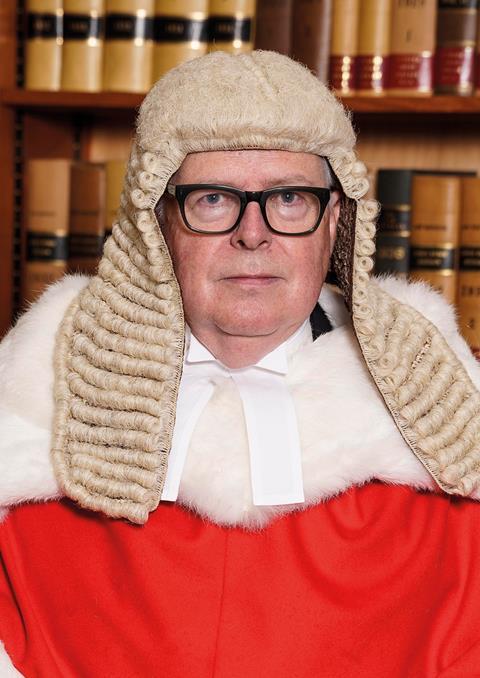As part of his package of reforms to civil litigation costs, Sir Rupert Jackson introduced costs capping orders (CCOs) to control the amount of future costs which a party may recover by way of a court order. This article considers the Court of Appeal’s recent decision in PGI Group Limited v Margret Thomas and others [2022] EWCA Civ 233, in which Coulson LJ refused permission to appeal the first instance decision of Mr Justice Cavanagh (pictured) who refused the applicant’s application for a CCO.

The CCO rules
The CCO regime is governed by section III of CPR r3, and r.3.19(5) sets out the conditions that must be satisfied before a CCO is granted. The court may, at any stage of proceedings, make a CCO against all or any of the parties if: (a) it is in the interests of justice to do so; (b) there is a substantial risk that without such an order, costs will be disproportionately incurred; and (c) it is not satisfied that the risk in subparagraph (b) can be adequately controlled by case management directions and detailed assessment of costs. In considering whether to exercise its discretion under the rules, the court will consider all the circumstances of the case, including whether there is a substantial imbalance between the financial position of the parties; whether the costs of determining the amount of the cap are likely to be proportionate to the overall costs of the litigation; the stage which the proceedings have reached; and the costs which have been incurred to date and the future costs.

PGI Group Limited
The respondents (the claimants in the action) were 31 Malawian women who were employed by a Malawian company to work in tea or nut plantations in Malawi. They alleged that they were sexually assaulted, harassed and discriminated against by male employees of the company. It was accepted that the claims had been legitimately brought in the UK, and the trial had been listed to commence in June 2022. It was also common ground between the parties that the likely damages to be awarded to the respondents if they were successful were modest by English standards, and likely to be substantially lower than their own legal costs. The respondents, however, argued that their claim was as much about vindication and the acknowledgement of wrongdoing as it was about damages.
The parties had exchanged costs budgets. The respondents’ future costs were estimated to total £1,513,628, and the applicant’s future costs were estimated to be £1,750,000. The total costs to trial (including pre-budget costs) were approximately £5,600,000. The applicant made an application for a CCO to restrict the respondents’ recoverable costs in the event of their success to 10% of what they anticipated it to cost to run the matter to trial. The consequence of such a CCO would be that the respondents would be forced to discontinue their claims in England, but they could pursue their claims in Malawi.
High Court decision
At first instance, Cavanagh J refused to make a CCO because none of the three pre-conditions required by a CCO had been made out. He held that, although the sums which the respondents may recover might be modest, they were very significant for the respondents. He explained that the claims were about much more than money: the respondents wanted to show that they were telling the truth; they wanted to restore their reputations; and they wanted to bring the abuses to an end. Cavanagh J accepted that the claims were arguable and that there were no grounds for striking out the claims. He also held that a CCO would force the respondents to discontinue the proceedings which would stifle the claim.
The applicant applied for permission to appeal Cavanagh J’s decision on the grounds that he applied the wrong proportionality test; he failed properly to take account of the costs already incurred in his analysis; and that he was wrong to hold that the costs of prosecuting the claims in Malawi was irrelevant to proportionality.
Court of Appeal decision
Coulson LJ held that the application to appeal could not succeed for five general reasons. First, although the judge refused to make a CCO, he did calculate costs budgets for both sides. In exercising his discretion, he took into account all the facts and matters raised by the parties; and the issue of proportionality, which was the entire focus of the application, was just one element of the judge’s overall evaluation. The judge had a wide discretion on issues of costs which he was entitled to exercise (see F & C Alternative Investments (Holdings) Ltd v Barthelemy (No. 3) [2012] EWCA Civ. 843). Second, the judge concluded that none of the pre-conditions under r.3.19(5) had been met. The three grounds of appeal raised by the applicant went to the second pre-condition (whether there was a substantial risk that, without a CCO, costs would be disproportionately incurred). The grounds did not go to either the first pre-condition (that a CCO is not in the interest of justice) or the third (that the risk of costs being disproportionately incurred could be adequately controlled by cost budgeting). That was fatal to the application because the judge dealt with both of those two pre-conditions, and rejected the applicant’s case on each. Third, the judge properly considered the rules on proportionality. Fourth, the judge’s conclusion that it would not be proportionate to make the CCO was not only well within the ambit of his discretion, but was also a conclusion which the vast majority of judges would also have reached. Finally, the applicant had failed to demonstrate that it is arguable that there are exceptional circumstances which justify the making of a CCO.
Coulson LJ also rejected the applicant’s three grounds of appeal. On the first, Coulson LJ held that the judge had correctly concluded that he did not need to decide the point regarding the making of a CCO for less than the minimum sum required to litigate the claims through to completion in the High Court. He agreed with the respondents that the first ground of appeal amounted to no more than a complaint that the judge did not reject the point of principle even more forcefully than he did. Coulson LJ was also in no doubt that one of the reasons that the judge baulked at the CCO was because of the very low figure that was being suggested. The costs involved required express consideration of a lengthy list of factors and in such circumstances the judge is ‘not obliged to cast around and seek to find another figure, which neither party is contending for, and suggest that figure instead’. Turning to the second ground, Coulson LJ found that the judge expressly noted in his judgment that the incurred costs were £1.6m but at the hearing of the application for a CCO, there was no analysis of that figure and no material on which the judge could properly conclude that only a part of that figure would be recovered on assessment. If the applicant wanted the judge to reach specific conclusions about the costs which had already been incurred, they needed to make detailed submissions on the amount of those incurred costs, and what was unreasonable and disproportionate and why. Finally, the third ground of appeal was dismissed because the judge had taken into account the fact that there was an available alternative forum, but there was no suggestion that the claim in the UK was not properly brought and therefore the fact that there was an alternative forum was irrelevant. Furthermore, the costs of pursuing the claim in Malawi were irrelevant to the making of a CCO in the UK. If a claim is validly brought in the UK, then that brings with it the reasonable and proportionate costs of pursuing those proceedings in the UK.
The decision is an important one, not least because it illustrates the continuing exceptionality of CCOs. It illustrates the need for applicants seeking a CCO to ensure that the necessary pre-conditions under r3.19 are properly satisfied, namely that a CCO is in the interests of justice; that there is a substantial risk that, without such an order, costs would be disproportionately incurred; and that the risk of costs being disproportionately incurred cannot be adequately controlled by costs budgeting. The decision is also interesting for the considerable weight which both the High Court and the Court of Appeal placed on the non-monetary aspects of the case; Cavanagh J referred to this as ‘personal vindication’ which was as important as monetary compensation when considering the principle of proportionality under CPR r.44.4(3)(c). Despite being introduced as a costs controlling mechanism, CCOs will continue to be very rare.
Masood Ahmed is an associate professor at the University of Leicester and research fellow on the Vici Affordable Access to Justice project, Erasmus University, Netherlands































No comments yet